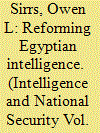| Srl | Item |
| 1 |
ID:
172662


|
|
|
|
|
| Summary/Abstract |
China has demonstrated an apparent capability to develop stealth fighters. While Chinese aviation technology should not be underestimated, this essay strikes a cautionary note. Using historical examples from Argentina, Egypt, and India, the author contends that Chinese stealth fighters are being unveiled in part to highlight China’s arrival as a global power; however, future Chinese jet fighter development will be hindered by technical challenges such as the development of indigenous engines—not to mention advanced weapons and sensors.
|
|
|
|
|
|
|
|
|
|
|
|
|
|
|
|
| 2 |
ID:
067722


|
|
|
|
|
| Publication |
London, Routledge, 2006.
|
| Description |
viii, 264p.
|
| Standard Number |
0415370035
|
|
|
|
|
|
|
|
|
|
|
|
Copies: C:1/I:0,R:0,Q:0
Circulation
| Accession# | Call# | Current Location | Status | Policy | Location |
| 050663 | 358.171820962/SIR 050663 | Main | On Shelf | General | |
|
|
|
|
| 3 |
ID:
164182


|
|
|
|
|
| Summary/Abstract |
This article examines how Great Britain helped create Pakistan’s Inter-Services Intelligence Directorate (ISI) with two goals: (1) establishing a Pakistani branch of a Commonwealth intelligence network; (2) ensuring information security within that network. Ultimately, this endeavor failed because of perceived deficiencies in Pakistan’s security institutions and Britain’s inability to address Pakistan’s security needs. By the mid-1950s ISI forged close ties with the United States which offered more and with fewer political strings attached. This article offers new insights on intelligence alliance formation during the cold war. It also provides a useful case study in the weaknesses of multilateral intelligence coalitions.
|
|
|
|
|
|
|
|
|
|
|
|
|
|
|
|
| 4 |
ID:
119415


|
|
|
|
|
| Publication |
2013.
|
| Summary/Abstract |
In 2011 intelligence reform became a timely and pertinent topic in Egypt with the overthrow of President Hosni Mubarak by mass demonstrations. Yet two outstanding questions persist: can Egyptian intelligence be reformed? What would intelligence reform entail in the Egyptian context? An examination of historical Egyptian intelligence reforms suggests that 'reform' in the Egyptian context usually means greater efficiency and centralization at the expense of public oversight and accountability. Prospects for fundamental intelligence reform are further hampered by Egypt's authoritarian traditions, its relatively weak legislature and judiciary, lack of an empowered civil society, censorship and an apparent official addiction to secrecy.
|
|
|
|
|
|
|
|
|
|
|
|
|
|
|
|